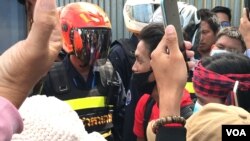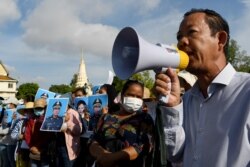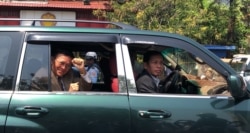Moung Sony lost contact with his younger brother, Moung Sopheak, on the afternoon of September 10. Hours later, Moung Sony, the president of the Khmer Student Intellectual League Association, was informed by the United Nations officials that Moung Sopheak was arrested by the police.
Moung Sopheak, who is also a member of KSILA, was seen three days earlier at a rally that was blocked by local authorities and security personnel. The rally was calling for the release of youth activists arrested in the past month over incitement charges, including KSILA vice president Mean Prommony.
According to the government, all the arrested activists, who initiated the protests to call for the release of jailed unionist Rong Chhun, had attempted to commit “incitement to cause chaos by jeopardizing public security.”
“They do not deserve to be persecuted,” said Moung Sony. “This is a blow for democracy and human rights in Cambodia.”
Moung Sopheak’s detention is one of some 30 arrests by the government since the end of July, an intensification of an ongoing crackdown against dissent and peaceful assembly.
Nineteen unionists, youth, and rights activists have been placed under pre-trial detention on alleged incitement charges, according to the local rights group Licadho. The jailed activists worked with youth advocacy group Khmer Thavrak, environmental watchdog Mother Nature and KSILA.
At least eight other former grassroots activists of the now-outlawed Cambodia National Rescue Party across the country were sentenced to serve a range of five to seven years in jails over “plotting to overthrow” the government. Some 15 other of their colleagues are being detained, awaiting trials on the same charge.
The arrests and persecutions have coincided with the partial revocation of Cambodia’s trade preferences to the European Union, the ongoing COVID-19 pandemic, and a global economic slowdown. Observers said these events have factored in the government’s heavy-handed reaction to its critics, while also revealing the government’s recent indifference to pressure from Western nations.
This shift was evident from the arrest of prominent unionist Rong Chhun over his comments on the Cambodian government’s handling of border demarcation with Vietnam. His arrest was just 12 days ahead of the August 12 implementation of the E.U.’s partial suspension of the “Everything But Arms” trade privileges.
Rong Chhun had consistently called for Prime Minister Hun Sen’s government to reverse its course to ensure that export privileges, vital to Cambodia’s garment and footwear industry, were maintained. He was also supportive of multiple protests at garment factories over unpaid wages and incentives during the COVID-19-induced economic downturn.
In March, a month after E.U. announced that it planned to scale back the trade preferences, Hun Sen targeted Rong Chhun.
“Cambodia is making it clear that Cambodia will not beg for that 20 percent back. Please the analyst, 'ah' Rong Chhun, listen clearly on this,” Hun Sen said, using a term before the unionist’s name that can be used in a derogatory manner.
Ouk Chhayavy, president of the Cambodian Independent Teacher Association, said the arrest of her mentor and colleague – Rong Chhun used to head the union – was a move to intimidate others who have benefitted from his advocacy.
“Rong Chhun was arrested and as you know he is a very influential person who would always stand side-by-side with workers under the rain and sunshine,” Ouk Chhayavy told VOA Khmer.
The arrest of Rong Chhun and the detention of nearly two dozen youth and human rights defenders were quickly noticed by the United Nations.
“The current situation marks a deepening of the Government’s intolerance to dissent and repression of the rights to freedom of expression, peaceful assembly and association,” said U.N. human rights spokesperson Ravina Shamdasani.
“It is mainly directed at human rights organizations, environmentalists and human rights defenders.”
In a statement last week, the E.U.’s European External Action Service said there had not been “any indication of substantive progress” in its call for Cambodia to open up the country’s political space for a “credible and democratic opposition to operate.”
“The E.U. is seriously concerned about the continuous deterioration of democracy and human rights in the country,” E.E.A.S. spokesperson Nabila Massrali told VOA Khmer.
“We continue to call on the Cambodian government to take concrete action to reopen the political space in the country, to reverse the shrinking space for civil society and to ensure the respect of freedom of expression and peaceful assembly.”
Another matter at hand, and an issue consistently raised by the E.U. since 2018, is the treason trial of opposition leader Kem Sokha and the dissolution of the party he led till 2017.
Prime Minister Hun Sen has suggested that the prolonged and delayed treason trial against opposition leader Kem Sokha could be delayed to 2024, well beyond scheduled local and national elections in 2022 and 2023, according to government-aligned newspaper Khmer Times.
Cindy Cao, who researches E.U.-Cambodian relations at the Brussels-based European Institute of Asian Studies, the recent series of arrests and Hun Sen’s remarks on the Kem Sokha trial reflect Phnom Penh’s “consistent defiance” of the E.U.’s push to correct the country’s democratic failings.
“Hun Sen acknowledges negotiations between the E.U. and the government regarding the E.B.A. issue is an influencing factor on Kem Sokha's verdict,” Cindy Cao told VOA Khmer in an email.
“It can be said the threat of trade sanctions did not deter the government's use of repression and to restrict freedom of expression,” she added.
The researcher added the government was likely balancing political concessions it was comfortable with and the economic cost of its continued crackdown, the latter likely resulting in domestic unrest.
“Many studies suggest that authoritarian states would prefer to pay an economic cost, rather than imperil its regime survival,” Cindy Cao said.
Cambodian government spokesperson Phay Siphan repeated the regime’s defense of its actions, which is to maintain the country’s sovereignty. He added that the current clampdown was unrelated to the E.B.A. revocation.
“Cambodia prioritizes peace and the absence of chaos in society because Cambodia is an underdeveloped country – not as [rich as] the E.U. – so the arrests and the crackdowns are to ensure harmonious living conditions,” said Phay Siphan.
KSILA’s Moung Sony is still amazed at the government’s assertion that the youth activists, including his brother, were trying to instigate chaos when they were only advocating for their rights and that of others.
“They are all ordinary citizens taking nothing but flags to the protests and petitioning rally. They hold no weapons,” he said. “They are peaceful, blameless, and are often beaten by the security forces; how is it even possible that they can create chaos?”










